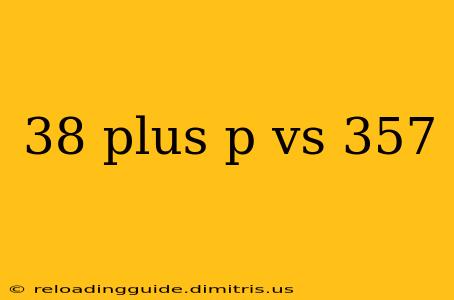Choosing the right cartridge for self-defense or recreational shooting can be a daunting task. Two popular choices often debated are the venerable .38 Special and the powerful .357 Magnum. While seemingly similar, these rounds offer distinct advantages and disadvantages. This detailed comparison will help you understand the nuances of each, enabling you to make an informed decision based on your specific needs and preferences.
Caliber and Case: Understanding the Basics
Both the .38 Special and .357 Magnum use the same diameter bullet—approximately .357 inches. The key difference lies in the cartridge case length and the resulting powder capacity. The .357 Magnum case is significantly longer, allowing for a much larger powder charge. This translates directly to higher velocity and greater stopping power.
Key Differences Summarized:
| Feature | .38 Special | .357 Magnum |
|---|---|---|
| Case Length | Shorter | Longer |
| Powder Capacity | Less | More |
| Velocity | Lower | Higher |
| Recoil | Lower | Higher |
| Stopping Power | Moderate | High |
| Cost per Round | Generally Lower | Generally Higher |
| Availability | Widely Available | Widely Available |
Ballistics: Power and Performance
The increased powder capacity in the .357 Magnum results in significantly higher bullet velocities. This translates to greater penetration and stopping power, making it a more effective round for self-defense against larger threats or in situations requiring deep penetration. However, this added power also comes with considerably more recoil.
Recoil and Control: A Significant Factor
The .357 Magnum's substantial recoil can be challenging for some shooters, especially those with less experience or smaller builds. This can affect accuracy and the ability to make follow-up shots quickly. The .38 Special, with its gentler recoil, is often preferred for practice and training, allowing for more comfortable shooting sessions and improved marksmanship development.
Applications: Choosing the Right Cartridge
The best choice between the .38 Special and .357 Magnum depends heavily on its intended use:
.38 Special:
- Target Practice: Its lower recoil makes it ideal for consistent practice and developing shooting skills.
- Concealed Carry (for some): While some choose it for concealed carry due to manageable recoil, the stopping power may be a concern for some individuals. Consider your state laws and personal comfort level.
- Home Defense (with limitations): It's sufficient for home defense in many cases, but the .357 Magnum provides greater stopping power if facing a significant threat.
.357 Magnum:
- Self-Defense (primary): Its greater stopping power makes it a popular choice for self-defense against serious threats.
- Hunting (small game): Suitable for small game hunting, though other calibers might be better suited depending on the game.
- Law Enforcement (historically): Historically a favored round in law enforcement, although modern agencies are increasingly using other cartridges.
Revolver Considerations
Both calibers are commonly chambered in revolvers. A key advantage of using a .357 Magnum revolver is its ability to also fire .38 Special rounds. This versatility allows for using milder .38 Special ammunition for practice and switching to the more potent .357 Magnum for self-defense or hunting.
Conclusion: A Matter of Personal Needs
Ultimately, the choice between a .38 Special and .357 Magnum depends on your individual needs and priorities. If recoil management and comfortable practice are paramount, the .38 Special might be the better option. However, if maximum stopping power is your primary concern, the .357 Magnum's superior performance makes it a strong contender. Consider factors such as your experience level, physical strength, intended use, and personal comfort level before making your decision. Always consult with experienced shooters and firearm professionals for personalized guidance.

